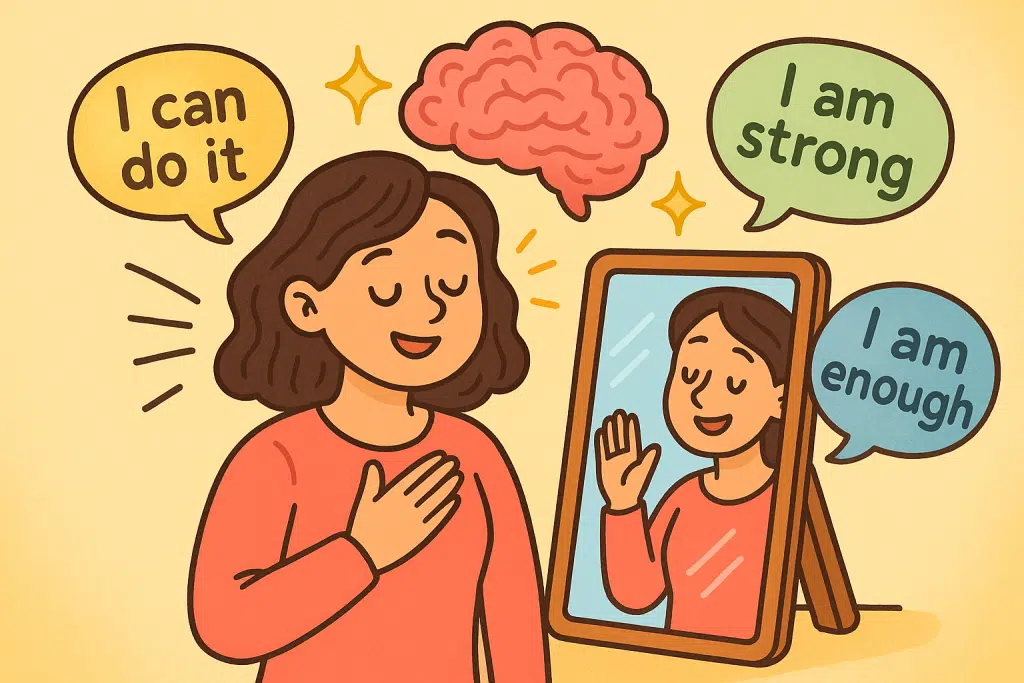The Power of Positive Affirmations for Mental Wellness
Charlotte Stone August 11, 2025
Let’s be honest: 2025 has us all juggling a ton. The world keeps tossing curveballs, and our mental wellness—especially our sense of “I’ve got this”—is more fragile than ever. The surprising hero popping up? Positive affirmations. Yep, those simple, deliberate statements you repeat to yourself. They’re trending, sure—but there’s legitimate science behind why they can help reduce anxiety, boost focus, and even make your career grind feel more aligned and powerful.

1. What’s new in the affirmation universe (2025 style)
A. Brain science giving affirmations a glow-up
Affirmations aren’t just woo-woo—they actually light up reward and self-processing areas in the brain, like the ventromedial prefrontal cortex and ventral striatum. That means your brain’s literally tuning in, going “Hey—this feels good, let’s do more.”
In fact, folks who dwell on future‑oriented affirmations (“I will…” instead of “I am…”) especially when struggling with low self-esteem, showed better outcomes. So shifting tense might make a world of difference.
B. Affirmations roll with stress and resilience
Self‑affirmation theory (a psychology OG from the ‘80s) tells us that reflecting on personal values helps buffer stress and reduces defensiveness. In practical terms: before a big meeting or crisis, affirming what matters to you can calm your nerves and sharpen your focus.
C. Tiny habits, big impact
The Berkeley micro‑practice study had college kids hold their hearts for just 20 seconds daily, repeating self‑compassion affirmations—boom: lower stress, improved emotional well‑being. Short and sweet, yet meaningful.
Similarly, UCSF and UC Berkeley’s Big Joy Project found that 5–10 minutes of micro‑acts of joy—such as practicing optimism or gratitude—boosted happiness, lowered stress, and enhanced emotional control in nearly 18,000 participants. Combine that with affirmations and it’s mental wellness gold.
D. Affirmations in schools? You bet.
India’s CBSE is now encouraging daily affirmations in morning assemblies—starting academic year 2025–26—to build resilience, focus, and emotional balance among students. If kids can get this early and grow with it, imagine how powerful that shift can be.
E. Optimism’s getting a brain badge
A Kobe University study, published just two weeks ago, found that optimists share distinct neural patterns when thinking about the future (thanks, prefrontal cortex), and they process positive vs. negative scenarios more clearly. That neural flexibility? Affirmations can help cultivate it.
2. How affirmations actually fuel mental wellness and career flow
Rewiring your mental default
Practicing affirmations—whether saying them, writing them, or meditating on them—can physically shift neural pathways and improve emotional resilience. Over time, it becomes your brain’s autopilot to focus on possibility rather than deficit.
Lowering stress reactivity
When you affirm personal values or strengths before a stressful event, your cortisol response lowers. Studies show people who do values‑affirmation essays before exams have significantly calmer stress levels.
Enhancing emotional regulation and self-compassion
When negative self-talk rears its head, affirmations shift your brain toward self-kindness and detachment from that critic voice. This builds emotional self-regulation—a foundation for mental wellness and stress endurance.
Fueling productivity without burnout
Affirmations don’t just soothe—they energize. Especially when future‑focused (“I will learn this,” “I will follow through”), they activate motivation, clarity, and purpose. Think of it as a mental springboard for career hustle.
3. Real tools & trends using affirmations (2025-forward
Trend 1: AI-powered journaling that guides your affirmations
A top emerging tech: Resonance, an AI‑augmented journaling app that pulls your past memories and turns them into personalized affirmation-like prompts. Users who logged and reflected reported improved mental health and positive affect—and lower PHQ‑8 (depression) scores. It’s like having your personal affirmation assistant.
Trend 2: “Lemonading”—clear-eyed optimism with a twist
Instead of forcing fake positivity, the concept of lemonading encourages realistic reframing—acknowledging struggles while still spotting hope. Affirmations here act as “go‑mantras,” simple phrases like “I’ve got this” or addressing yourself by name to avoid cringe vibes.
Trend 3: Affirmations meet wellness ecosystems
Programs like Three Principles Psychology promote the idea that your mental experience comes from thought—and affirmations naturally fit here by guiding thought to well‑being. Such frameworks integrate affirmations with mindfulness and wellness coaching, making them less cheesy and more coherent with therapy-oriented practices.
Trend 4: Positive psychology meets school routines
Beyond India’s CBSE adoption, we’re seeing positive psychology models like PERMA and gratitude practices paired with affirmations to support youth emotional well-being—an indicator that affirmations are being institutionalized as preventive tools, not just self‑help fluff.
4. Step-by-step guide to building an affirmation routine that actually works for wellness + career
1: Choose the right wording (future-focused works better)
- Use “I will…” instead of “I am…” if self-esteem is shaky.
- Align affirmations with your values (trust, creativity, resilience). The self-affirmation theory says value-based affirmations are more effective.
2: Keep it micro-practice friendly
- Just 20 seconds daily can shift self-compassion and well-being.
- Or insert 5–10 minutes of affirmation-centered micro-acts into your day (after lunch, before a pitch, etc.).
3: Combine affirmations with reflection or journaling (AI optional)
- Try writing a short affirmation and then journaling why it matters.
- Even better: use Resonance or a simple memory‑anchored prompt to make your affirmation personal and grounded
4: Anchor affirmations in work contexts
- Before a task or meeting, have a go‑mantra ready: “_____ will do this with clarity.” Maybe even your own name: “Hey Alex, you got this.” Helps sidestep the cheesy factor
5: Institutionalize it (ritualize!)
- Build affirmations into daily routines—morning moment, commute mantra, lunch reset.
- Teach or share them (if you’re leading a team)—makes it communal and reinforces buy‑in, just like the CBSE school model
6: Track effects & tweak as needed
- Notice shifts in mood, stress levels, focus.
- Ditch what feels forced; keep what sparks energy or calm. Affirmations should feel honest, not hollow.
5. Real example routine (borrowing from Gen-Z vibes)
Early morning (pre-coffee stretch)
“I will face today with courage and clarity.”
(20-second micro practice—repeat these quietly while breathing deeply.)
Midday slump (post-lunch reset)
“[Your Name], you bring value. You can do this.”
(Pump-up phrase inspired by the “third‑person coach” trick
Afternoon stretch (after a small win)
“I will keep building small steps toward what matters.”
(Journal one sentence about the small win and how it connects to your values. Maybe use Resonance-style reflection.)
Evening unwind
“I will rest knowing I did my best today.”
(Short reflection: what felt good? What grew?)
Keep rolling: Why this matters for mental wellness and career productivity
- Neuro-friendly: Affirmations engage brain reward centers, reinforcing positivity over time.
- Stress buffer: Value-based affirmations can flatten stress hormones and calm nerves.
- Resilience builder: “Lemonading” gives you grit—and affirmations scaffold that grit.
- Habit formation: Micro-practices and rituals make positivity sustainable—not overwhelming.
- Career clarity: Future-centric phrasing clarifies goals and fuels purposeful action.
- Well-being integration: From schools to workplaces, affirmations fit within broader positive psychology ecosystems—no cringe, just aligned practice.
Final thoughts
Alright, friend, here’s the real talk: affirmations aren’t magic, but they’re mighty. When used with intent, anchored in your values, and carried out consistently—even in 20-second bursts—they rewire your brain to focus on what matters. And when your mind’s in the right lane, your productivity isn’t a frantic sprint, it’s a calm, sustained stride toward purpose.
Whether you’re trying to calm anxiety, sharpen your focus, or show up better—in life or career—affirmations give you a mental baseline of “I’ve got me.” And in 2025, that might be the boldest move.
References
- Cherry, K. (2023). How Positive Affirmations Can Help You. Verywell Mind. Retrieved from https://www.verywellmind.com
- University of Pennsylvania. (2022). The Science Behind Positive Affirmations. Penn Today. Retrieved from https://penntoday.upenn.edu
- Psychology Today. (2021). The Power of Self-Affirmation. Retrieved from https://www.psychologytoday.com







